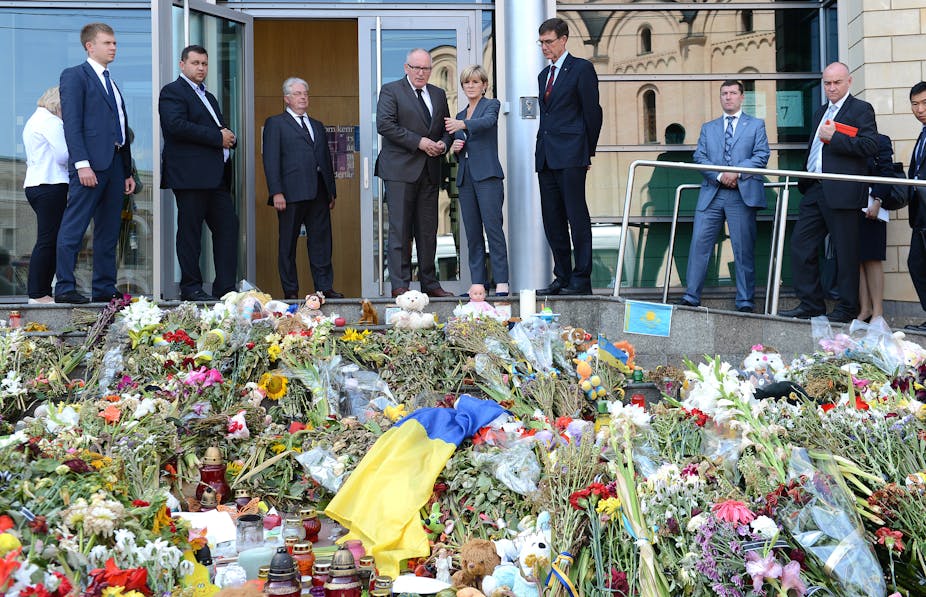Political success often contains within it policy contradictions that eventually cause the “successful” initiative to fail. So it may be in the Dutch-Australian initiative to secure and forensically investigate the crash site of flight MH17. The mission was halted yesterday because it was deemed too dangerous for the team of investigators as fighting raged around them.
The policy contradiction is that while a laudable outcome of the initiative is that the site be secured and investigated (the “investigation” outcome), an equally important outcome is that the investigators are kept safe (the “safety” outcome).
Australia’s prime minister and foreign minister formulated the initiative around the first outcome. They have said publicly, continuously, that on-site “investigation” and recovery of the victims’ bodies is our prime objective. On the day the first bodies were airlifted out, reporters were told that “all the bodies, all the possessions and all the wreckage” were to be recovered. That apparently is no longer the position.
Risky policy is popular unless it backfires
Polling shows this initiative, dubbed Operation Bring Them Home, has been popular in Australia. Tony Abbott is considered to have shown leadership on this issue, causing his public approval rating as prime minister to rise. People are not going to change their vote but they like what has been done.
But the initiative is very high risk. It is reported that teams of unarmed Dutch and Australian crash investigators take six hours to get to the site in order to avoid battle zones under threat of rocket assault. Journalists taking a slightly different route have found themselves under attack.
Could this risk have been avoided? A battle zone is, by definition, a dangerous place, but more could have been done to mitigate the risk. The initiative contains within it a policy contradiction that could have been resolved early with more careful formulation.

Abbott wishes to be seen as an “objective”, “scientific” investigator not tasking political sides in the war. However, the policy context must also be taken into account: unarmed investigators in a battle zone place themselves and those they are seeking to assist in harm’s way. Witness the rocket assault on United Nations-protected schools in Gaza.
The danger of a poorly thought-out policy is that actions are taken and driven by a reckless commitment to achieve a single outcome (“investigate”) at the cost of unspoken outcomes (“safety”).
The forms this danger will take on the ground are many and varied but if this contradiction opens up in the case of the MH17 crash site, lives will be lost.
This peril is abstract to those being polled but policy professionals must be alert to the dangers of poorly formulated public policy. After all, the Royal Commission into the previous government’s home insulation scheme shows exactly how poor policy formulation can cost lives. Then prime minister Kevin Rudd and his environment minister were eager to stimulate the economy and drove actions that disregarded safety. People died.
This example also highlights that on-ground safety protocols do not protect lives when a reckless outcome is in full swing. Therefore, in the case of the MH17 crash investigation, it is not comforting for the on-ground investigators to assure us that they have safety protocols in place.
A history of poor policy formulation
Foreign policy in Australia has history of poor policy formulation. A single outcome is often presented to the detriment of more complex analysis. Recently, international tension has been created by a failure to resolve or manage competing outcomes.
Examples from recent administrations show such problems could be avoided or mitigated with more careful thought. The Rudd government, for example, participated in a defence white paper process that labelled our largest trading partner, China, as a security threat. A contradiction was opened up between security and trade, which could have been mitigated with more careful policy formulation.
Former prime minister Julia Gillard embraced the idea of placing US Marines in Darwin, part of a US encirclement of China, which is not in Australia’s national interest and ignores competing, more subtle objectives Australia has to achieve with China.
Policy formulation is a professional skill but in short supply in Australia’s foreign policy corp. Is it that politicians blunder into foreign policy without technical prowess, or is it that the foreign policy officials in the Department of Foreign Affairs are inadequately trained?
A book by a recent foreign minister, Bob Carr, suggests both factors may be to blame. He describes a series of quite arbitrary decisions he made on his own or decisions made sitting around with what he describes as inadequately prepared officials.
Let us hope that that no lives are lost in the investigation of the MH17 crash site. If so, this will be because of sensible operational decisions, not because of good policy formulation.

